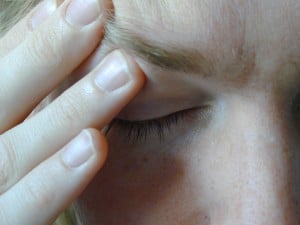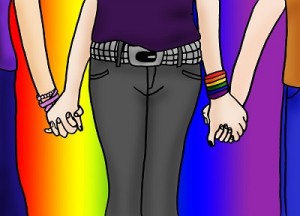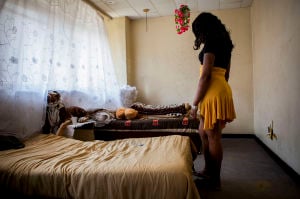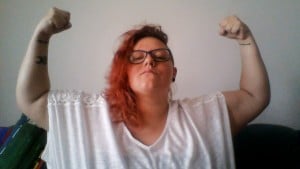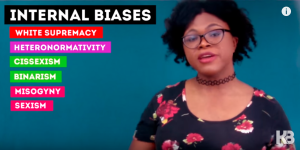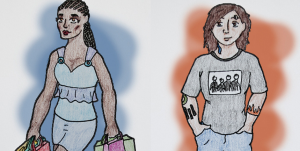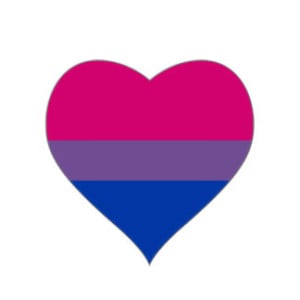
A person wearing a knit scarf stands in a sunny field and smiles at the viewer.
(Content Warning: sexual assault)
Like many others, I’ve had a rough time this year. 2016’s meme-worthy level of awfulness has hit me hard – and I can’t wait for it to be over.
As someone who’s experienced sexual assault, it’s been a particularly triggering year.
The election of Donald Trump, the outcome of the Brock Turner case, the Bill Cosby trial, and a wave of anti-rape protests at my own university were all events that affected me deeply.
While I can’t promise that 2017 is going to be better, I’m going to enter the year wiser, more resilient, and more compassionate than ever before.
2016 has taught me to take care of myself, so I want to make resolutions that help me do just that.
If you don’t want to make resolutions, I really don’t want you to feel as if this article is pressuring you to make any. Resolutions aren’t for everyone: Many find them hard to stick to and even triggering, given how many resolutions focus on weight loss.
However, we sometimes need a fresh, new start to renew our dedication to practicing self-love and self-care.
I’ve decided to make a few decisions about how to deal with 2017 – decisions that speak to me as a victim of sexual assault. If you’ve been sexually assaulted, I hope that some of these resolutions will speak to you and inspire you to go into 2017 with a renewed sense of self-love and hope.
1. I Promise Not to View My Bad Days as Failures
I often feel like I’ve come really far in my recovery, only to have my hopeful outlook shattered by a bad day.
One of my favorite quotes is “Healing is not linear.” And it’s true.
Healing doesn’t mean every day is better than the last. Healing is sometimes gradual, sometimes tumultuous. Sometimes we take a step back, but that doesn’t mean we’re ultimately not going to move forward.
In 2017, I’ll stop viewing my bad days as a sign that I’m not healing.
I’m going to allow myself space to feel depressed, anxious, triggered, or simply sad, without overanalyzing my pain.
I’m not going to punish myself for struggling.
I’m going to heal at my own pace.
2. I Will Learn to Ask for Help When I Need It
During those bad days, it’s imperative that I have support.
Something I learned in 2016 is that I have a damn good support network of friends and family members. But simply having a support network isn’t enough: We have to learn how to use that support network by asking our loved ones for help.
For many people, asking for help is hard. We don’t want to seem weak or vulnerable in a society that vilifies mental illness and emotional instability.
It’s also difficult to ask for help when your mental health is really bad because it’s hard to know what sort of help you need.
Instead of me asking people to simply “support me,” I’m going to get specific about the sort of support I need.
I’m going to start asking things like “Could you visit me at home/in the hospital?” or “Could you distract me by coming over to watch a movie?” or “Could you help me by running an errand/getting me some food/reminding me to take my meds/helping me tidy up?”
These things are all specific actions people can take when they’re trying to support someone who’s struggling.
3. I Will Engage with My Tendency to Self-Blame
Like many victims or survivors of sexual assault, I’ve encountered a great deal of victim-blaming.
I’ve often been told that I could have avoided rape if I was dressed conservatively, if I stayed in my home, if I knew self-defense, or if I were sexually conservative.
Of course, I’m not to blame for my assaults – my rapists are. But I’ve still internalized a lot of that victim-blaming. While I know better on an intellectual level, I sometimes blame myself for having been assaulted.
In 2017, I’ll put more effort into working through my sense of self-blame.
At the same time, I won’t shame myself for internalizing those messages. Self-blame is a natural, if unfortunate, reaction we have to living in a society where rape culture is prevalent.
I’ll work at cutting the blame out, but I’ll stop thinking of myself as a bad feminist or a hypocrite for internalizing it.
After all, piling on the guilt will help nobody.
4. I Won’t Pursue Relationships with People Who Don’t Deserve Me
People who victim-blame me, disrespect my boundaries, or support my abusers don’t belong in my life.
I resolve to cut those people out of my life when possible. Snip snip.
Cutting people out of your life isn’t always easy. Sometimes it’s not even possible. For example, we might be financially dependent upon toxic people like our parents or employers.
But, as much as I can, I need to make a change for the better. I deserve it.
At the very least, I promise to stop pursuing relationships with people who don’t deserve me. I will no longer do emotional labor for people who don’t return the favor.
5. I Promise to Be Gentle with Myself If I Don’t Meet All (Or Any) of These Goals
We often put a lot of pressure on ourselves to heal quickly – but of course, pressuring ourselves into healing is totally counter-productive.
My resolutions are an important guide that will hopefully help me to treat myself better.
But I refuse to punish myself if I don’t stick to them.
If I don’t do any of these things, it doesn’t mean I’ve failed.
It doesn’t mean I don’t deserve healing. It doesn’t mean I don’t deserve happiness.
It just means that I need time and, perhaps, a different strategy.
I promise to be gentle with myself if my trauma gets worse and not better. No matter what happens, I promise to love myself and prioritize my needs.
***
2016 has been a tough year for so many victims and survivors of sexual assault, and I truly hope that the events of 2017 are less traumatic.
But regardless of what happens, I want us – as survivors and victims of sexual assault – to be able to draw on our collective power as a community to heal and learn together.
May 2017 be the year you deserve.
[do_widget id=’text-101′]
Sian Ferguson is a Contributing Writer for Everyday Feminism and full-time freelance writer based in South Africa. Her work has been featured on various sites, including Ravishly, MassRoots, Matador Network, and more. She’s particularly interested in writing about queer issues, misogyny, healing after sexual trauma and rape culture. You can follow her on Twitter and Instagram. Read her articles here.
Search our 3000+ articles!
Read our articles about:
Our online racial justice training
Used by hundreds of universities, non-profits, and businesses.
Click to learn more





